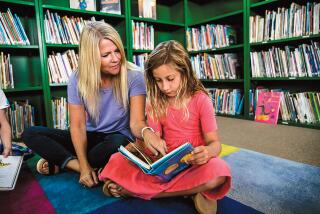Role of Books and Computers in Education
- Share via
I emphatically agree with Jeff McQuillan, “Give Students Books Before Bytes,” and equally wholeheartedly disagree with Wendy Lazarus and John Bryson, “Wiring Our Children for Success” (Commentary, Jan. 22), on the roles of computers in general education.
From personal experience with computers since 1963, I firmly believe they cannot be surpassed as high-speed calculators but they cannot teach. Witness the horrible job the personal computer industry does training users in how to master their products. The substitution of computers for books and eye-to-eye contact with human teachers is a recipe for exacerbating an already monstrous problem.
Looking over the shoulder of my granddaughter and her second-grade classmates, I observe that the content of the material in computer teaching is shallow and encourages only peripheral development of learning skills.
If the business world is so keen on providing a pool of computer talent, let businessmen revisit the practices of generations ago and establish apprenticeships in the technologies so important to them and leave the public schools to do their job without the distractions of high-tech toys and the Internet.
LOUIS M. ST. MARTIN
Pomona
* McQuillan made a very good point that children need adequate school libraries. He points out that the ratio of books to children in California is less than half the national norm. His article contains the solution to the problem! “For kids who come from upper- and middle-income families [books to read] is not a problem . . . Most of them already have books--lots of books--at home.”
Parents, take the good-quality books of recent print that your kids don’t need anymore and give them to the school libraries. Those of us who can afford “a book a month” in subjects the librarian needs might want to buy a new book and send it to the school library along with your child. I have done this for some time. In this way, the library gets books and your child learns to value libraries.
MARILYN WRIGHT
Riverside
* Lack of money is the problem. Lance Takeo Izumi (Column Right, Jan. 26) is correct when he says that there is no relationship between reading scores and the amount of money invested in schools. Keith Lance of Colorado found, however, that when money was put into school libraries, resulting in better library collections, there was a strong relationship to reading scores.
As McQuillan pointed out, research shows a clear link between reading achievement and the quality of school libraries, and California spends very little on school libraries (in elementary schools we spend $8.48 per child; the national average is $15.44). Literacy is a problem we should throw money at, but we have to aim carefully.
STEPHEN KRASHEN
Malibu
More to Read
Sign up for our Book Club newsletter
Get the latest news, events and more from the Los Angeles Times Book Club, and help us get L.A. reading and talking.
You may occasionally receive promotional content from the Los Angeles Times.








